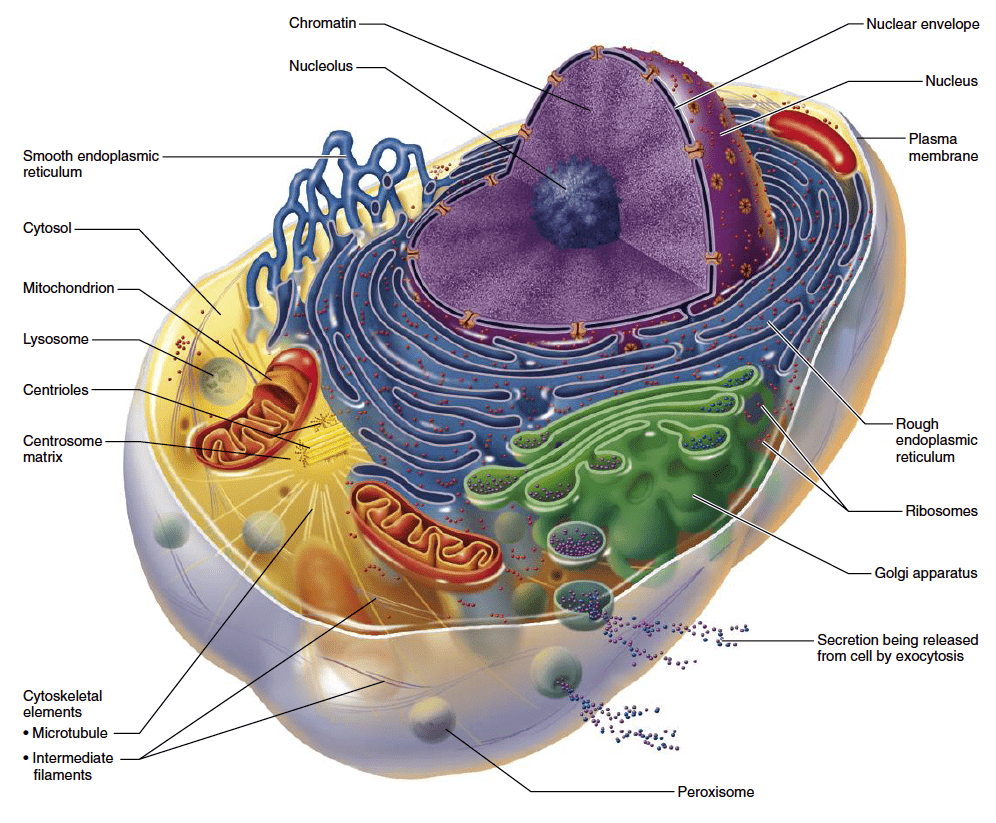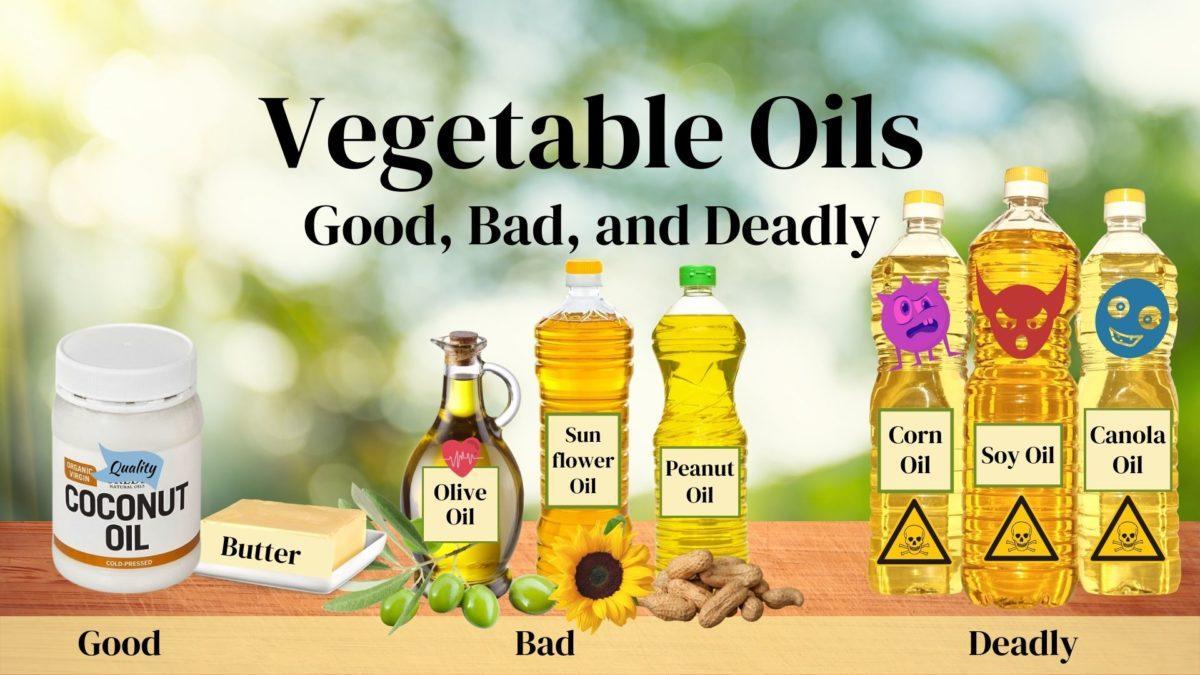 For years I suffered unexplainable allergies and brain fog. When I stopped eating refined vegetable oils, my symptoms vanished. Now I eat old-fashioned oils and saturated fats like butter, ghee, coconut oil, and pure unmixed Artisan olive oil (which BTW is getting harder to find). When I eat cheap GMO vegetable oils, my body feels like it “can’t breathe”, as if I have difficulty focusing, my body is gummed up, and the cells can’t release. Now that I read the scientific studies of vegetable oil on the brain, I see that my feeling was “right on”.
For years I suffered unexplainable allergies and brain fog. When I stopped eating refined vegetable oils, my symptoms vanished. Now I eat old-fashioned oils and saturated fats like butter, ghee, coconut oil, and pure unmixed Artisan olive oil (which BTW is getting harder to find). When I eat cheap GMO vegetable oils, my body feels like it “can’t breathe”, as if I have difficulty focusing, my body is gummed up, and the cells can’t release. Now that I read the scientific studies of vegetable oil on the brain, I see that my feeling was “right on”.
Until the 1950’s butter and lard were the go-to cooking fats in America. Our human diet has changed radically in the past 100 years. Now, GMO vegetable oils are everywhere, and so cheap that everyone thinks it’s normal. Sadly, the destruction of our health takes several years, so we hardly ever traced our illness back to the oil we consume. Vegetable oils high in LINOLEiC ACID effectively suffocate the cell mitochondria. They reduce brain function, causing accelerating aging, disease, and dementia. I believe VEGETABLE OILS are a HUGE factor in our cancer epidemic and loss of health for millions of people.
A Few Definitions:
- PUFA = Poly-Unsaturated Fatty Acids are a type of fat found in vegetable oil and many foods. Fats are sometimes categorized as “Saturated”, “Mono-unsaturated”, and “Poly-unsaturated”. We’ve been told for many years to avoid saturated fats and eat more unsaturated fats. However, now research is very clear that saturated fats are actually very healthy and beneficial for health. Purposeful confusion here is likely.
- Omega-6 = A type of Poly-unsaturated fatty acid found in high concentrations in vegetable oil.
- Linoleic acid = A specific polyunsaturated PUFA Omega-6 fatty acid found in vegetable oils. Linoleic acid is associated with cancer.
- Fat = Usually refers to a lipid that is solid at room temperature.
- Oil = Usually means a lipid that is liquid at room temperature.
Summary:
- Fats: What is their Cellular Function in the Body? Oils lubricate, maintain body temperature, control brain function and mitochondrial activity in the cell. Certain unhealthy oils limit your mitochondria’s ability to remove toxins from the cells, especially in the brain. The worst culprits are PUFA Omega-6 oils high in Linoleic acid, commonly called Vegetable Oils.
- What are GOOD, BAD, and DEADLY Oils Based on Limiting Linoleic Acid % ?
BEST oils are Coconut 2%, Butter 2%, Ghee 2%, Avocado 8%, Mustard 10%, Lard 10%, Palm 10%, and pure Artisan Olive oil 10% (but hard to find).
BAD oils are Grapeseed 73%, Sunflower 68%, Commercial Olive oil 55%, Sesame 54%, Rice Bran 39%, and Peanut 32%.
DEADLY oils are Safflower 78%, Corn 59%, Cottonseed 54%, Refined 51%, Soybean 51%, Sugar Cane Oil 41%, Canola 21%, Margarine and Vegetable Spread c. 59%. - Vegetable Oils a Root of Heart Disease, Inflammation, Cancer, Alzheimer’s and Parkinsons’ Disease? Studies show a correlation between PUFA Linoleic acid with accelerated aging and all disease, especially neural disease, which becomes apparent in old age. Persistent 20th-century myths of saturated fats and cholesterol have been long been dispelled by knowledgeable experts.
- Doctor Johanna Budwig Tried to Block the Polyunsaturated Takeover. German biochemist and physicist nominated 7 times for the Nobel Prize in Medicine, had a 99% success rate healing cancer with healthy oils. She explained the cure for cancer in her book “The Oil Protein Diet”. Dr. Budwig sent the vegetable oil corporations packing; however she was unable to stop the onslaught and passed way in 2003.
- How To Survive in a World of Vegetable Oil? Bless your food, shop carefully, Ask for the best oils in restaurants, know your big corporations, and avoid the big offenders.
- Solution: Switch to the BEST oils and Eliminate Sugar.
1. Fats: What is their Cellular Function in the Body?
Fats have an essential role in our body. Fats help lubricate everything – the brain, joints, connective tissues, cell membranes, and blood vessels. Fats are especially essential to your BRAIN, since your 100 billion neurons are 60% fat. Fat is an essential component in bone marrow, the root of your body’s DNA, blood, and stem cell creation. Think about it – your bone marrow has a 70% fat content.
Fats help maintain the body’s internal temperature. Fat is stored around organs and under the skin. In the reproductive system, fats are required for proper sexual function. Fats help to regulate hormones, our body’s chemical messengers.
Vegetable Oils Harm the Cell Mitochondria
Recent scientific studies show that toxic by-products of PUFA oxidation can lead to mitochondrial damage which is measurable. We can also infer a relationship between oil consumed and disease by observing trends of increases in certain diseases that correlate with changes in vegetable oil consumption. Correlation is not proof, but the link is unmistakable.
What are Mitochondria?
The mitochondria are coiled filaments inside cells. These are membrane-covered cell organelles, bits of material, that metabolize to power the cell’s biochemical reactions and energy production!
Tired Mitochondria – A Cause of Aging?
Mitochondrial energy production declines with age. We have much evidence that mitochondrial dysfunction underlies many age-related diseases, including Parkinson’s disease, Alzheimer’s disease, cancer, heart disease, fatigue syndromes, and genetic conditions.
Aging means decreased cell vitality, increased free radicals, increased inflammation – all of which are related to poor mitochondrial function. Perhaps if we solve the problem of sluggish mitochondria, we can solve the issues of aging.
Vegetable Oils Reduce the Mitochondria’s Ability Expel Toxins
Studies show that a diet of Omega-6 oils (PUFAs high in linoleic acid) can instigate “nitrosative damage” (inability to expel waste) in the mitochondria of the cells, and this can cause heart dysfunction. Over time weakened mitochondria can lead to a wide variety of health issues including fatigue and obesity.
Hint: The brain has by far the MOST mitochondria of any organ. Healthy mitochondrial function is central to cell survival or death, inflammation, and our entire body immune system.
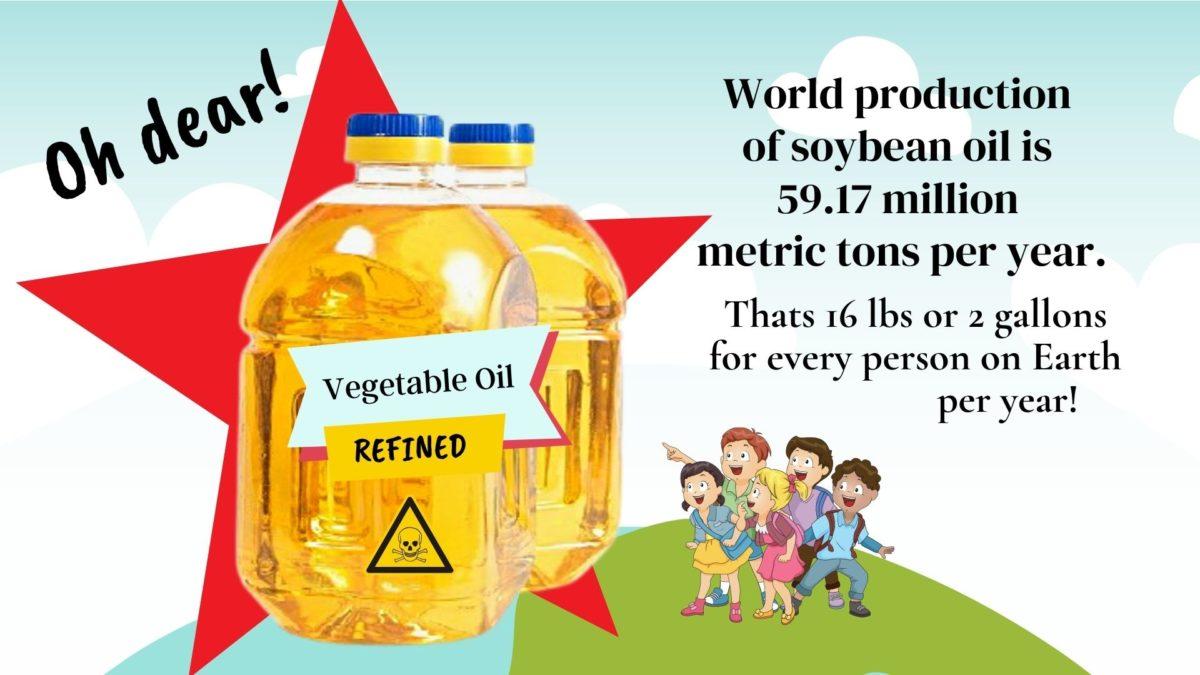 How Are Vegetable Oils Made?
How Are Vegetable Oils Made?
Vegetable oil is often a blend of soybean oil and corn oil. But there are many other vegetable oils. To product them, the seeds from those plants are cleaned then ground in heat, before being pressed between magnets to remove trace metals. Then they are are run through harsh solvents before being boiled to remove any traces of the solvents. The oil is then extracted and refined with heat and sodium hydroxide or sodium carbonate which makes a soap. Then it is spun in a high-pressure centrifuge to wash and remove the soap. Finally it is bleached and deodorized into the clear, tasteless liquid we find on the grocery shelf.
Many people think vegetable oil is natural, however it is more accurately a highly processed industrial food-like liquid. Geneticallly modified oils are so cheap to produce, that the food industry uses it in so many things, such as deep-frying, which further degrades our health. As a result, people don’t realize they eat large amounts of vegetable oil each day. This can lead to inflammation, heart disease, diabetes, and cancer.
Excessive PUFA in our body fat is now at 5-6X historical levels, and this also causes disease. Unfortunately, these oils are susceptible to oxygenation and therefore instable. Dr. Cate states:
“Too much PUFA depletes the body’s antioxidant capacity, causes oxidative stress, generates free radicals, and coats the cell membranes with a hard polymer substance. This blockage can shut down and permanently damage mitochondria, DNA, and create more toxins in the cell. The negative effects can soon be seen all over the body in two primary ways: 1) Arterial plaque, and 2) Decreased brain function due to mitochondria damage of nerve cells.”
2. What are the GOOD, BAD, and DEADLY Oils?
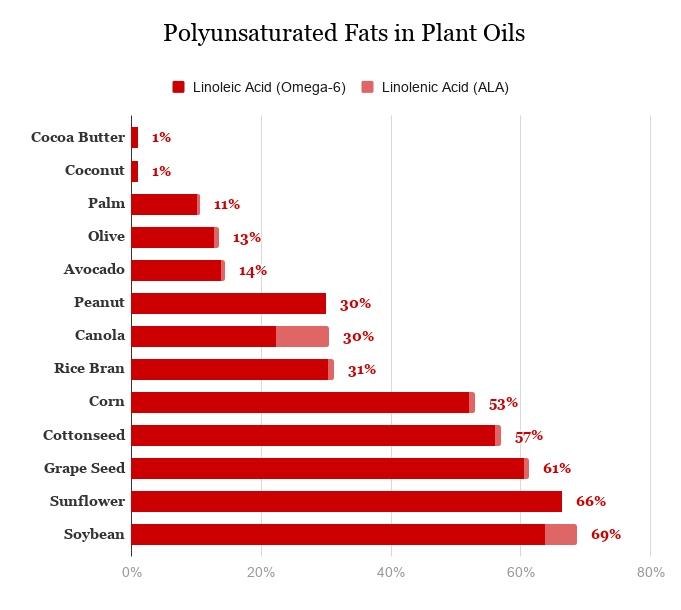
BEST OILS:
Coconut oil – 2% Coconut oil is by far my personal favorite oil. To date, over 1,500 studies show coconut oil to be one of the healthiest foods on the planet. Coconut oil uses and benefits go beyond what most people realize. Coconut oil is made from fresh coconut flesh, and is a true superfood. The digestion of medium-chain fatty acids (MCFAs) by the liver creates ketones which help in preventing Alzheimer’s disease. Coconut oil helps prevent heart disease and hypertension. It increases the healthy HDL cholesterol in your body, and helps convert the LDL “bad” cholesterol into good cholesterols. It has many uses for oral health, skin softening, and weight loss.
Butter and Ghee –10% These are great choices for health! Butter is a rich source of vitamins A, D, E, and K – all needed for the body and especially the brain. Ghee has milk solids removed, so it is lactose-free, making it better for those with sensitivities to dairy. Ghee has a higher smoke point when compared to butter, so it doesn’t burn as quickly. This is perfect for sautéing or frying foods. Butter can smoke and burn at 350°F (177°C), but ghee can withstand heat up to 485°F (252°C).
Avocado oil – 8% Natural compounds in Avocado oil have been linked to prevention of cancer, age-related macular degeneration, and cardiovascular diseases.
Palm Oil – 10% About one-third of all vegetable oil used worldwide is palm oil. That’s why palm oil is found in over half of processed foods in supermarkets worldwide. It’s health benefits include brain support and lowering risk of heart disease. In the United States, palm oil is not used widely. Ecological problems surround palm oil production including loss of animal habitat and poor working conditions in plantations.
Lard – 10% Lard is made from pork, and is a very healthy oil, especially when it is fresh. Pure lard has a neutral taste and no pork flavor. Lard is loaded with vitamin D, and is the second highest food source of vitamin D, after cod liver oil. One tablespoon of lard contains 1,000 IU’s of vitamin D. Lard has a high smoke point, making it ideal for frying foods.
Pure Artisan Olive oil – 10% The staple of the Mediterranean diet, olive oil comes in many types and flavors. Olives are a fruit, so this is not a vegetable oil. To make high-quality olive oil means picking and washing the olives, grinding and mixing them into paste, separating the fruit solids and water from oil in a centrifuge, removing sediment and water in a vertical centrifuge, filtering, testing, and bottling. Olive oil was once homemade in every village. Quality pure Artisan Olive Oil is extremely healthy, but hard to find nowadays. Sadly, over 60% of the olive oil in the world is mixed with cheap GMO vegetable oils. Blending with other oils softens the acidity and lowers the cost. How to find the good olive oil? Well, I look at the price, look for a small, reliable producer, and ask to be guided to the best bottle on the shelf.
Mustard Seed Oil – 10% Yellow mustard (Sinapis alba L.) is an important oil crop with total production about 43 million tons per annum, mainly in Bangladesh and India. Mustard seed oil has a dark color, pungent flavor and aroma. It is low in linoleic acid, high in selenium and magnesium, giving it anti-inflammatory properties.
One of the BEST! Flaxseed oil is one of the most balanced oils.
Raw, unprocessed flaxseed oil is a SUPERFOOD, so it’s not included in the graphic above. Flaxseed contains the most naturally balanced ratio of omegas of any food on the planet. Flaxseed oil is extracted from the seeds of the flax (Linum usitatissimum) bush. Omega 3 content is high, usually around 65%. Since the remaining fatty acids include both Omega 6 and 9, flaxseed oil is an ideal choice to provide a balanced omega intake. Flaxseed is delicate, damaged by heat, never used for cooking, and tastes delicious on salads.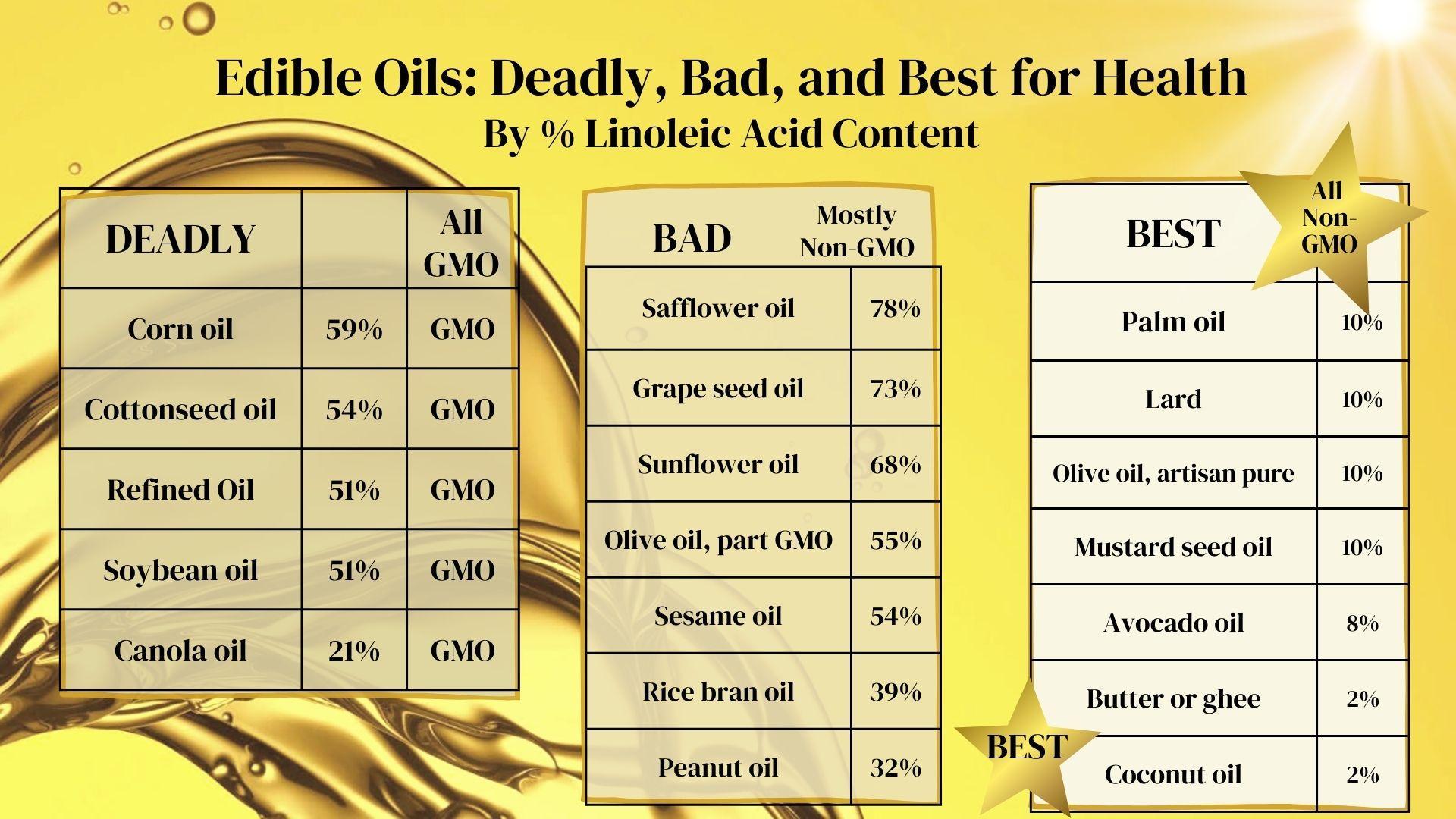 BAD OILS: Non-GMO, Medium Linoleic Acid
BAD OILS: Non-GMO, Medium Linoleic Acid
Safflower, Grapeseed, Mixed Olive Oil, Sesame, Rice bran oil, and peanut oil fall in my category of “bad oils”, because they contain significant levels of linoleic acid, which has been linked to the rise in cardiovascular disease, cancer, and obesity.
“Mixed olive oil” is my term for the majority of all olive oil sold in the world. Yes, about 60% of olive oil is blended with cheap GMO oils to soften the bitter taste of poor quality olives, and to reduce production cost. Sadly, for this reason, most so-called “olive oil” we see on the grocery shelves is part GMO and quite harmful to health.
DEADLY OILS: GMO oils high in Linoleic acid.
Corn oil, cottonseed oil, refined oil, soy oil, sugar cane oil, and canola oil are in a class of GMO oils that have recently been promoted globally in the past 100 years. They were never before seen as part of any human diet. These oils come from heavily sprayed seeds, highly refined with toxic chemicals to be tasteless, odorless, and devoid of nutrition. They are marketed worldwide as “generic oils” safe for frying and every use. But in fact, they are unstable, oxidize easily, and are very harmful. Sugar Cane Oil is new on the block, Genetically modified, relatively stable at high temperatures, with linoleic acid at 41%. Deadly.
Beware!
A new invasion of NON-GMO versions of canola and soy oils may APPEAR to be more desirable. Sadly, they are equally toxic as they contain high amounts of Omega-6 fatty acids, and plenty of pesticides such as glyphosate (This is allowed in “Non-GMO” foods.) Just skip all these toxic oils. Look for organic oils in the BEST category.
Since Sugar Cane Oil is not well known, the propaganda blitz just might work. Produced from GMO Sugar cane residue, Sugar cane oil is cheaper than soy oil, and equally toxic. And since Sugar cane oil is said to be relatively stable at high temperatures, it can be reused more without burning, ergo a profitable money-saving move. But even worse, Sugar Cane oil is very high in linoleic acid at 41%, compared to soy oil 51%. Polyunsaturated seed oils are high in Linoleic acid, associated with cancer. A healthier and cheaper alternative for Shake Shack would be palm oil, used worldwide with only 10% linoleic acid content and high smoke point. By far the healthiest choice is coconut oil with only 1% linoleic acid. No matter. I won’t be eating fries at Shake Shake.
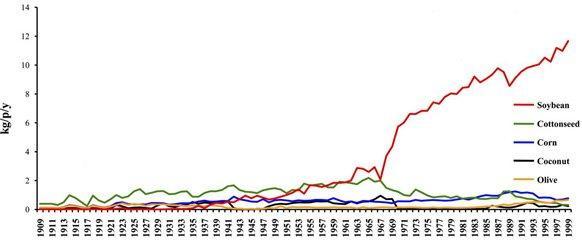
This chart shows the increase in soybean production that was once unknown in the food supply.
GMO seeds are especially produced and patented to be “owned” by the seed companies. Farmers who grow these GMO products must repurchase their seeds from the “seed owner” every season. The seeds are treated with pesticides. They are infused with design, intent, and purpose, which may not be healthy.
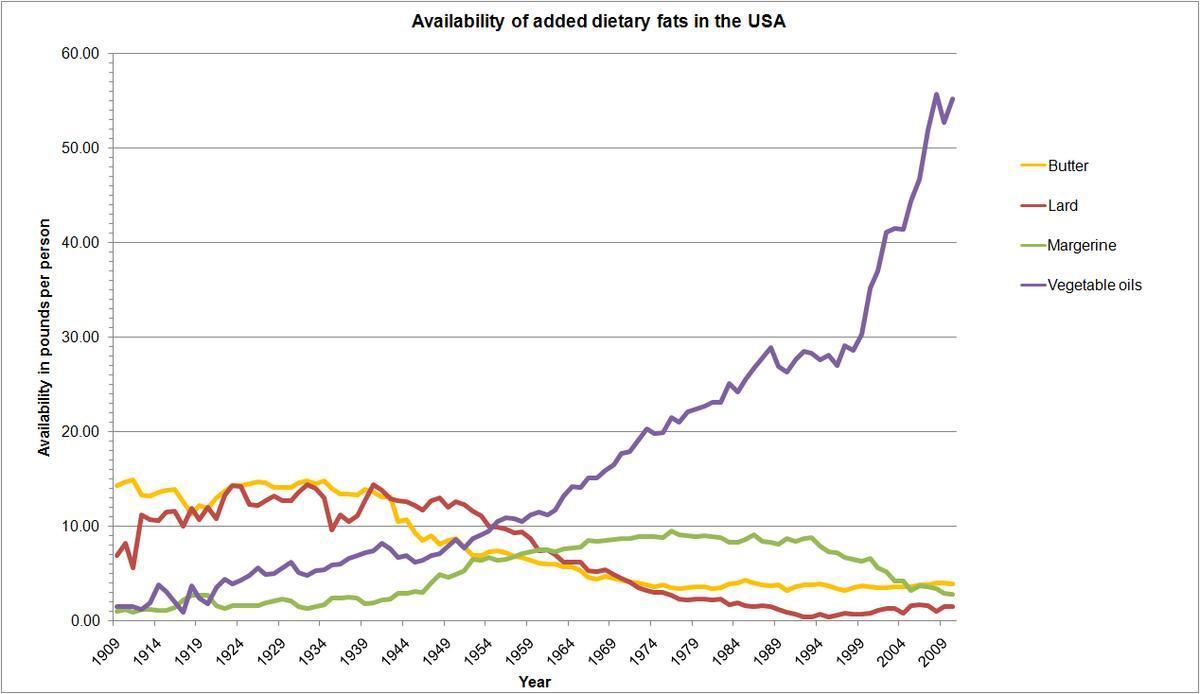
This chart shows the large increase in vegetable oil consumption that began in the 1960’s .
These oils are cheap to produce, and have been priced to undercut all other healthy oils, so that anyone in their right mind would choose them over traditional oils. In this way over a few decades, GMO oils have become the “accepted and normal” oil worldwide. Yet research shows they are linked to high incidence of cancer, heart disease, and obesity.
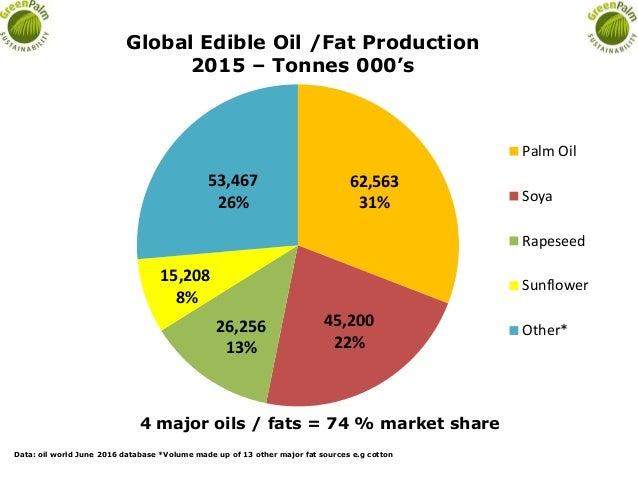
Which four vegetable oils made up 74% of the world edible oil market in 2015?
Palm, Soy, Rapeseed (canola), and Sunflower Oils.
3. Vegetable Oils: Root of Heart Disease, Inflammation, Cancer, Alzheimer’s and Parkinsons’ Disease?
A diet high in PUFA’s (polyunsaturated fatty acid) with Omega 6 fats, is not ideal for optimal health. Most of us were taught to prefer these Omega-6 refined vegetable oils at a young age. Sadly, this has led to the worst epidemic of chronic disease in history, with a global explosion of heart disease, diabetes, obesity, Alzheimer’s neurological disease, and cancer. Vegetable oils have eclipsed all other edible fats in the world, to the detriment of our health.
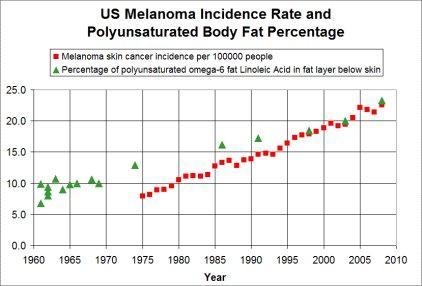
This chart shows a correlation between skin cancer and PUFA oil in body fat from 1960 to 2010 in the US.
Heart disease is the number one killer in the US today. This is startling since a little over a hundred years ago, it was practically unheard of! In fact, the first heart attack was first described in scientific literature in 1912, and heart disease has risen steadily since then.
Several studies found that too much omega-6 fatty acids from corn, soy, safflower, and canola, increases the oxidized cholesterol and arterial plaque. The major fat component of arterial plaque is PUFAs, polyunsaturated omega-6 fatty acids — not saturated fat. Other studies show that lowering the ratio of Omega6 to Omega3 consumption improved mitochondrial function, and fatty liver disease.
- Rose, et al. (1965): Replacing animal fat with corn oil for two years lowered serum cholesterol by 23 mg/dL but quadrupled cardiac and total mortality.
- Sydney Diet-Heart Study (1978): Replacing animal fat with vegetable fat for five years lowered cholesterol by five percent but increased total mortality by 50 percent.
- A study by the Università degli Studi di Brescia #NCT01223703 indicate that in patients with chronic heart failure on evidence-based medical therapy and New York Heart Association (NYHA), long term treatment with n-3 PUFAs 1 g daily reduces mortality and hospitalizations for cardiovascular reasons.
- Diets enriched in omega-6 fats caused mitochondrial damage, heart dysfunction, and arterial plaque in rats, with as little as 4 weeks of increased consumption. Decreasing the ratio of omega-6 to omega-3 fats results in a reduction of atherosclerotic plaques. The reduced ratio lowers inflammation and leads to less arterial plaque.
- Another study showed that lowering the ratio of Omega-6 to Omega-3 PUFA diet ameliorates the metabolic phenotype of adolescents with fatty liver disease. PMC7467848/

- A 2009 study by the Department of Pharmacology, at the University of Frankfurt, Germany showed that omega-3 linolenic acid supplements showed beneficial effects on the nervous and vascular systems in guinea pigs. The guinea pigs showed less nitrosative stress, stabilized mitochondrial membrane potential, and enhanced brain function
- A study by Advances in Nutrition (Bethesda, Md.), 01 Nov 2020, 11(6):1489-1509, states that Intake of ?-6 polyunsaturated fatty acid-rich vegetable oils is said to increase risk of lifestyle diseases such as Alzheimer’s, Parkinson’s, and type 2 diabetes.
Too much Linoleic Acid Drives Chronic Diseases, Worsens COVID-19
There’s virtually nothing more destructive to your body than seed oils in producing heart disease, cancer, age-related macular degeneration, diabetes, obesity and dementia. Tucker Goodrich explained that animals typically develop cancer once the linoleic acid in their diet reaches 4% to 10% of their energy intake.
“In short, linoleic acid contributes to the inflammatory domino effect that eventually kills some people with COVID-19.”
Tucker Goodrich, health crusader
Yet, most Americans get approximately 8% of their calories from seed oils. “So, we’re way over what these thresholds in the lab would suggest is a safe level of these fats based on the laboratory work in animals,”
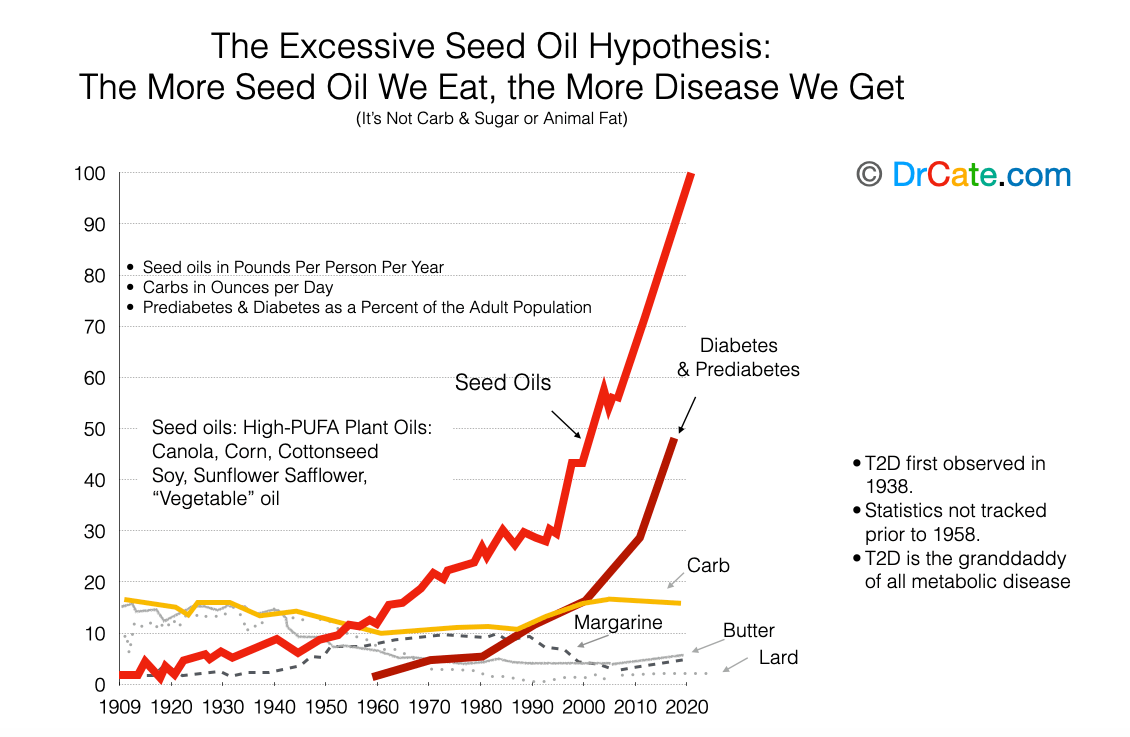
Hydroxynonenal from Vegetable Oil, Hidden Cause of Alzheimer’s and Parkinson’s Diseases?
A study published in Advances in Nutrition, the international review journal of the American Society for Nutrition, “Intake of Omega-6 Polyunsaturated Fatty Acid-Rich Vegetable Oils and Risk of Lifestyle Diseases” examined the evidence to see if there are links between the consumption of omega-6 PUFA-rich vegetable oils and the rise of a broad range of lifestyle diseases including arteriosclerosis, hypertension, cardiovascular disease, stroke, Parkinson’s disease, Ttype 2 diabetes, and cancer.
When heated, omega-6 PUFA-rich vegetable oils generate a substance known as hydroxynonenal, which researchers now believe plays a key role in cell degeneration and aptosis, or cell death. The authors focused their attention on how hydroxynonenal from omega-6 PUFA-rich vegetable oils affects human health. Examining the link between hydroxynonenal and Alzheimer’s disease, the authors found “evidence of hydroxynonenal-induced oxidative damage in Alzheimer’s patients.”
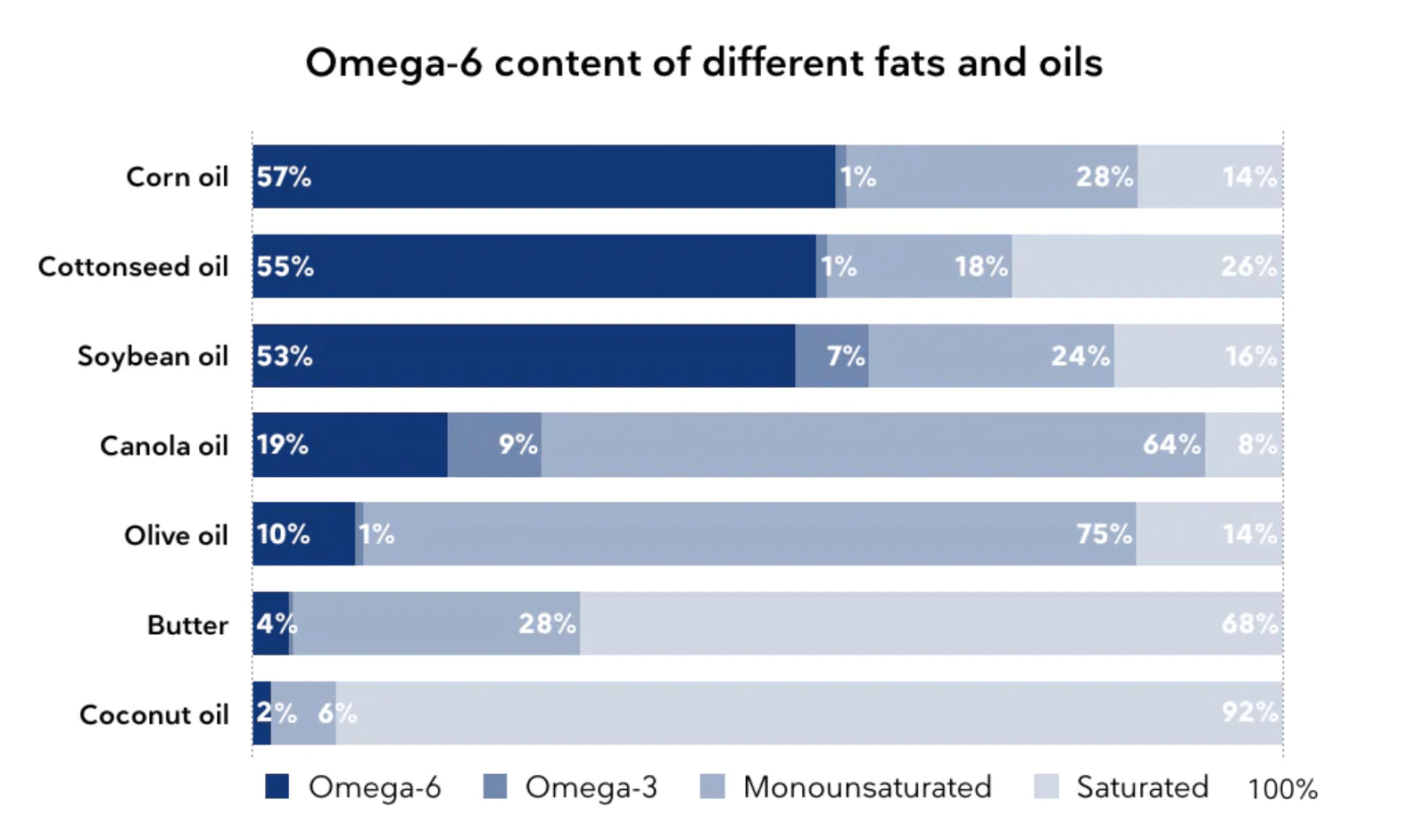
This chart shows the types of fatty acids in various oils.
The best and healthiest are lowest in Omega-6 at the bottom.
Hydroxynonenal is a toxin that affects the membrane of neurons that causes fat oxidation. This impairs the metabolism and transport of energy in the cells. Toxic hydroxynonenal is now seen as an important marker of cell damage and cell death in many diseases such as arteriosclerosis, CVD, stroke, type 2 diabetes, cancer, and liver diseases. The role of fat oxidation has been widely investigated in the progression of nerve diseases. For example, hydroxynonenal in a rat brain can damage neurons, damaging learning and memory.
Data also indicates that COVID-19 mortality rates are heavily influenced by the amount of unsaturated fats consumed. Simply put, vegetable oil intake is associated with increased mortality from COVID-19, while saturated fat intake lowers your risk of death. The authors noted that vegetable oils can lead to injury and organ failure resembling COVID-19.
The official medical position on the cause of Parkinson’s disease
is that nobody has a clue what causes dopamine producing brain cells to die. However, we know that a diet high in vegetable seed oils causes the Omega-6 fats in cell membranes to rise rapidly. Those fats oxidize quickly causing oxidative stress and cell damage. We also know that a major product of the oxidation of omega-6 fats is the dangerous chemical 4-Hydroxynonenal, which is especially toxic to dopamine-producing neurons. Aha! Perhaps have just identified the culprit, that seed oils cause Parkinsons?But no one dares make an enemy of the powerful seed oil industry?
Say Good-Bye to Outdated Myths of Death from Heart Disease
Old 20th-century myths of saturated fats and cholesterol have been dispelled by experts far more knowledgeable than me. One study showed that while replacing saturated fat with vegetable oil lowered total cholesterol by 14%, for every 30 point drop in total cholesterol there was a 22% increased chance of death. Many other trials have also found that replacing saturated fats with vegetable oils increase risk of death from ALL causes.
4. Doctor Budwig Tried to STOP the Polyunsaturated Takeover
Dr. Johanna Budwig (1908 – 2003), described as “the world’s leading authority on fats and oils” was nominated seven times for the Nobel Prize in Medicine. She had a 99% success rate healing cancer with healthy oils and explained the cure for cancer in her book “The Oil Protein Diet”. Dr. Budwig sent the vegetable oil corporations packing from Germany; however, she was unable to stop the onslaught and passed away in 2003.
Dr. Budwig was a German pharmacologist, cell chemist, and physicist with a doctorate in physics. She worked as the chief expert-consultant for drugs and fats in Germany’s Federal Institute for Fats Research – “Bundesanstalt für Fettforschung”. The Budwig Protocol was the diet and lifestyle she developed in the 1950’s that helped restore otherwise hopeless, advanced cancer patients back to health.
Following the work of Dr. Otto Warburg (himself a Nobel Prize winner) Dr. Budwig studied how cancer cells are anaerobic, meaning they thrive in a low-oxygen environment. Instead, they rely primarily on GLUCOSE (sugar) to survive.
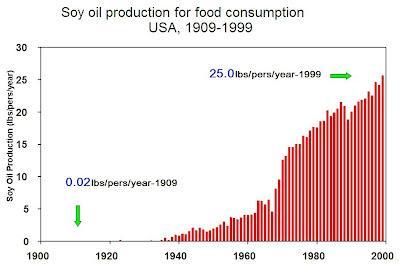
This chart shows a huge increase in soy oil production in the USA during the 20th century.
This is the reason that people with chronic disease should avoid processed sugar as much as absolutely possible – because isolated sugar fuels cancer cell replication through aerobic glycolysis, or sugar fermented into lactic acid.
Dr. Budwig studied in-depth the effect of vegetable oils on human health and found it to be disastrous. She discovered the truly “essential” and powerfully healing nature of essential fatty acids for healing cancer. She challenged and temporarily stopped the vegetable oil industry from their slow-takeover of the European oil market. Dr. Budwig’s book “The Oil Protein Diet” is used by many health practitioners and available online. Her healing protocol uses raw, unprocessed flasxeed oil and protein from quark, like cottage cheese.
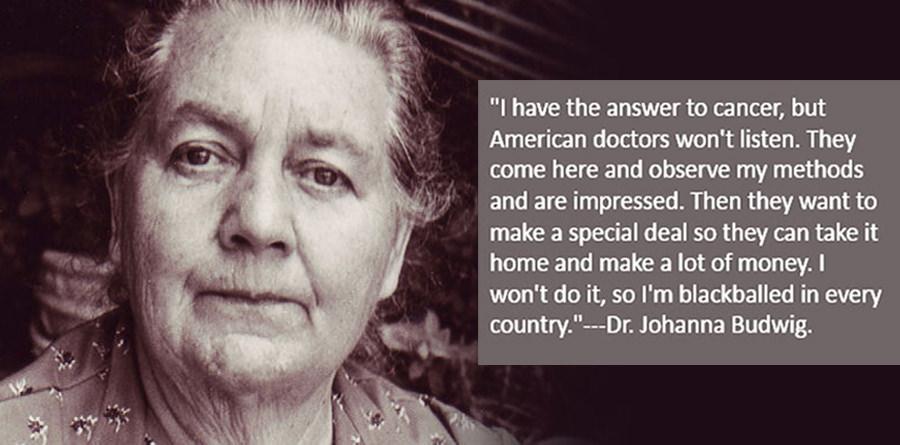
The Budwig Diet natural approach gave her a 99% success rate in healing cancer. Benefits include reducing inflammation, supporting heart health, balancing hormones, and protecting brain health. The Budwig Diet emphasizes healthy fats, especially omega-3s from nuts/seeds/fish like flaxseed oil, plus high antioxidant foods such as fresh vegetables, and fermented dairy products that provide probiotics.
According to Dr. Budwig, it is quite simple:
“In order for our bodies’ cells to process oxygen as fuel, they need certain enzymes to be present in the fat content of the foods we eat. However, because so much of the Standard American Diet (SAD diet) consists of chemically-treated, processed, sugar-laden, denatured foods, the necessary enzymes our bodies require for cellular respiration have been destroyed and in some cases even replaced by manufactured fats (i.e. trans fats) which are completely useless to the body.
Over time, this sets up a whole host of problems from heart disease, to skin and lung problems, to brain and liver problems, to diabetes and immune deficiency syndromes, to cancer. Simply put, to remain HEALTHY, our cells NEED to be able to process oxygen and use it efficiently, and the Budwig diet provides this.”
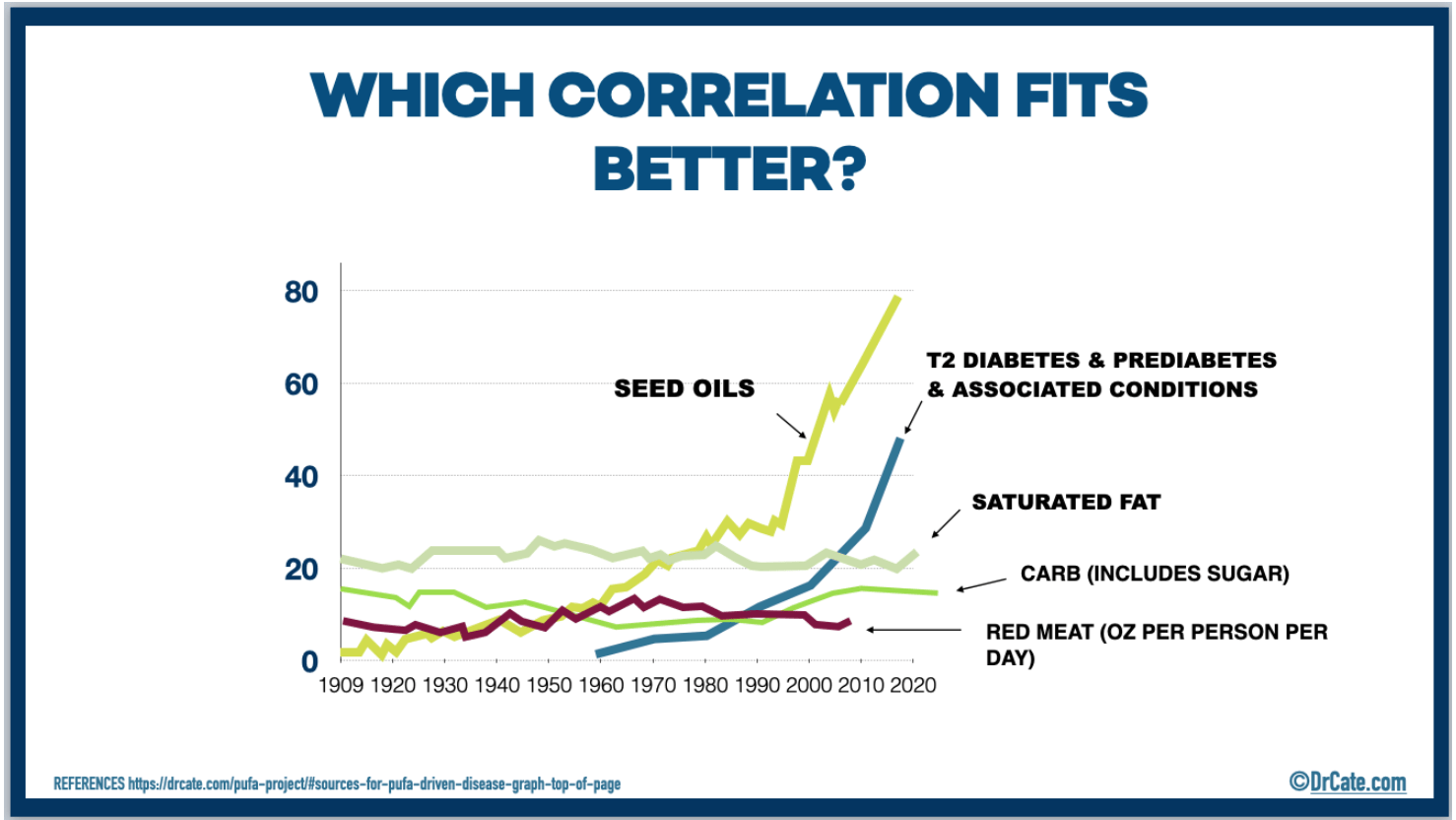
This graph shows the effects of seed oils vs. other suspects often blamed for disease. Correlation is not causation, however the correlation is clear. This graph suggests that seed oils are more responsible for chronic disease than sugar/carb and red meat.
5. How To Survive in a World of Vegetable Oil?
Bless your food.
Before eating, say a prayer. Which prayer is your choice. Bless it with gratitude, harmony, and love for Mother Earth and your highest Supreme Source, whatever you call that in your tradition. Be grateful for the food, ask to be truly nourished and blessed by the food. Pray to bless the earth, and thank the nutrition you receive. This is your way of creating harmony in your energy field.
Choose an Anti-Aging Lifestyle to Boost Your Mitochondria
Get good sleep, exercise, eat anti-oxidant foods, avoid Omega-6 vegetable oils, practice intermittent fasting, eat light, eat a balanced high-fat, low-sugar diet, live stress-free, and steer clear of all types of toxins. This will help your mitochondria.
Shop Local and Avoid the Big Corporations
Eat real food, unrefined, and hopefully directly from the Earth. Avoid refined foods. Eat lots of anti-oxidant foods, organic vegetables and fruits.
Avoid Big Organic Oil Distributors in USA: Adams Group, Cargill, Mizkan America, J.M. Smucker Company, NOW Foods, Nutiva, Bunge, Enzo Olive Oil, EFKO Group, KORIN Agricultura Natural, Spectrum, Catania Spagna, Eden Foods, TIANA Fair Trade Organics, Clearspring.
Avoid Big GMO Oil Distributors in USA: ACH Food, Archer Daniels Midland, Bunge North America, Cargill, Conagra, Dow AgroSciences, Mazola Oils, J. M. Smucker Company, Ventura Foods,
Eat Out Selectively
Ask for healthy oils. If the waiter doesn’t understand, ask what kind of oil they use. Request coconut oil, mustard oil, butter, or ghee. That’s why I eat at only organic restaurants and Indian restaurants. They know about oils. I always request the best oils. Just smile and people will get to know you! If you’re eating in a friend’s home and they serve you toxic foods, just bless it silently and eat very light. I sometimes say: “Oh dear, thank you so much, but I just ate.”
Avoid these Top 10 “Foods” with the WORST Omega 3-6 score:
- soybean oil
- mayonnaise
- tub margarine
- microwave popcorn
- Salad dressing
- potato chips
- stick margarine
- vegetable shortening
- peanut butter
- butter blends
- tortilla chips
6. Boost your Health: Switch to the BEST oils and Eliminate Sugar.
One of the best ways to boost your health and reduce the risk of disease is to replace dangerous vegetable oils with healthy fats. Sadly, the fats that promote ill health are the very ones we’ve been told are the healthiest, and vice versa. In my view, processed vegetable oils, rich in omega-6 polyunsaturated fatty acids (PUFAs), are the most dangerous dietary factor of them all.
Based on limiting linoleic acid, BEST oils are coconut, butter, ghee, avocado, mustard, and pure Artisan Olive oils. But the latter is hard to find as most olive oil is mixed with toxic GMO vegetable oils. Of course, SUGAR is the co-sponsor of all disease, so better quit that too! Thanks for reading!
Use it in your car! (Ha Ha! Just kidding)

Suggested Reading:
- How Industrial Seed Oils Are Making Us Sick, https://chriskresser.com/how-industrial-seed-oils-are-making-us-sick/
- Metainflammation: A Hidden Health Threat, by Dr. Michael Lam, https://www.drlamcoaching.com/blog/metainflammation-a-hidden-health-threat/
- Chronic Inflammation, Arizona Center for Advanced Medicine, https://www.arizonaadvancedmedicine.com/articles/2013/june/chronic-inflammation/
- Why Oil is Bad for You, Dr. Mark Hyman, https://drhyman.com/blog/2016/01/29/why-oil-is-bad-for-you/
- Is Soybean Oil Bad for You? Benefits vs. Risks, https://draxe.com/nutrition/soybean-oil/
- High blood pressure (hypertension) may be an autoimmune disease, https://www.belmarrahealth.com/high-blood-pressure-hypertension-may-be-an-autoimmune-disease/
- Could hypertension be an autoimmune disease?, https://medivizor.com/blog/SampleLibrary/hypertension/could-hypertension-be-an-autoimmune-disease/
- Chronic inflammation in the etiology of disease across the life span, https://www.nature.com/articles/s41591-019-0675-0
- CHRONIC CONSTIPATION AND THE ROLE OF THE GALLBLADDER, Shandra Combs – Functional Nutritional Therapy Practitioner, https://mtcapra.com/chronic-constipation-and-the-role-of-the-gallbladder/
- Know Your Fats : The Complete Primer for Understanding the Nutrition of Fats, Oils and Cholesterol, by Mary Enig
- WESTERN DIET, INFLAMMATION AND GUT BIOME, https://www.budwig-diet.co.uk/western-diet-inflammation-gut-biome/
- 7 Budwig Diet Benefits for Cancer Prevention, https://draxe.com/nutrition/budwig-diet-protocol-cancer/
- The Oil-Protein Diet Cookbook, by Johanna Budwig, /0969527225
- Omega 3’s, EPA DHA and ALA – Where Are You Getting Your EPA DHA From? https://www.selfgrowth.com/articles/Omega_3_s_EPA_DHA_and_ALA_Where_Are_You_Getting_Your_EPA_DHA_From_-.html
- https://www.organicconsumers.org/news/why-vegetable-oils-are-carcinogenic
- https://www.dietdoctor.com/low-carb/vegetable-oils
- https://gospelnewsnetwork.org/2022/01/27/the-worst-ingredient-for-your-immune-system/
- https://z3news.com/w/the-worst-ingredient-for-your-immune-system/
- https://www.organicconsumers.org/news/case-against-processed-vegetable-oils
- https://drpompa.com/cellular-detox/cellular-healing-diet-1-week-menu-plan/
- https://www.anticancermom.com/the-budwig-protocol-ccfo/
- https://roguehealthandfitness.com/vegetable-oils-promote-aging/
- https://drmindypelz.com/autophagy-fasting-slow-down-aging/
- Metabolites of arachidonic acid and linoleic acid in early stages of non-alcoholic fatty liver disease, https://pubmed.ncbi.nlm.nih.gov/26408952/
- Vegetable Oil and Linoleic Acid (Omega-6): Good and Bad vs Conjugated Linoleic Acid
https://onedaymd.aestheticsadvisor.com/2021/01/linoleic-acid.html - PUFAs: What They Are & Why You Should Ditch Them, https://integrumliving.com/pufas/
- The Functions of Lipids in the Body, https://opentextbooks.library.arizona.edu/demonscbook/chapter/5-the-functions-of-lipids-in-the-body/
- THE BRAIN IS 60% FAT? WHAT THE FAT?, https://docedwardsfitness.com/the-brain-is-60-fat-what-the-fat/
- PUFA-Project: Scientific References on Seed Oil Toxicity, “https://drcate.com/pufa-project/”
- Induction of mitochondrial nitrative damage and cardiac dysfunction by chronic provision of dietary omega-6 polyunsaturated fatty acids, https://pubmed.ncbi.nlm.nih.gov/17023268/
- Polyunsaturated fatty acids and their effects on cardiovascular disease, https://www.ncbi.nlm.nih.gov/pmc/articles/PMC2719153/
- Lipid composition of mustard seed oils, http://www.bcc.bas.bg/BCC_Volumes/Volume_49_Special_G_2017/BCC-49-G-Antova-55-60.pdf
- What’s in My Oil?, https://theconsciouslife.com/foods?lp[0]=Omega-6_to_Omega-3_Ratio&lm=10&order=asc
- https://roguehealthandfitness.com/do-vegetable-oils-raise-heart-disease-risk/
- https://lowcarbcardiologist.com/lccp037-tucker-goodrich-omega-6-seed-oils-and-our-health-another-medical-paradox/
- Plant derived omega-3-fatty acids protect mitochondrial function in the brain, https://tahomaclinic.com/Private/Articles2/EFAs/
- Vegetable Oil: The Real Culprit behind Alzheimer’s Disease, Tetsumori Yamashima, https://www.omicsonline.org/open-access-pdfs/vegetable-oil-the-real-culprit-behind-alzheimers-disease-2161-0460-1000410.pdf
- Alzheimer’s Symptoms Worsened by Canola Oil—and It Could Cause Onset of Dementia, Scientists Warn, https://www.newsweek.com/alzheimers-symptoms-worsened-canola-oil-and-it-could-cause-onset-dementia-741233
- https://nutrition.org/vegetable-oils/
- Intake of ?-6 Polyunsaturated Fatty Acid-Rich Vegetable Oils and Risk of Lifestyle Diseases, https://academic.oup.com/advances/article/11/6/1489/5867525?
- Does vegetable oil cause cancer?, https://www.dailymedicaldiscoveries.com/does-vegetable-oil-cause-cancer/
- PUFA Promote Cancer, https://www.functionalps.com/blog/2011/11/21/pufa-and-cancer/
- Intake of ?-6 Polyunsaturated Fatty Acid-Rich Vegetable Oils and Risk of Lifestyle Diseases, https://europepmc.org/article/PMC/7666899
- Every Drop Of Vegetable Oil Takes Us Further Along The Path To Parkinson’s Disease, https://davidgillespie.org/every-drop-of-vegetable-oil-takes-us-further-along-the-path-to-parkinsons-disease/
- Life of Johana Budwig, https://www.budwig-stiftung.de/en/dr-johanna-budwig/her-life.html



